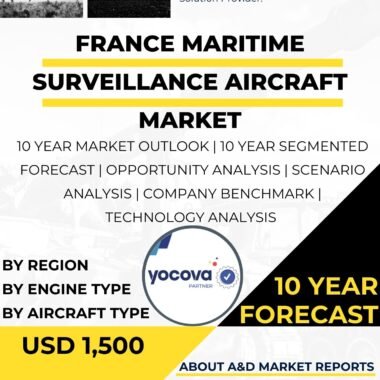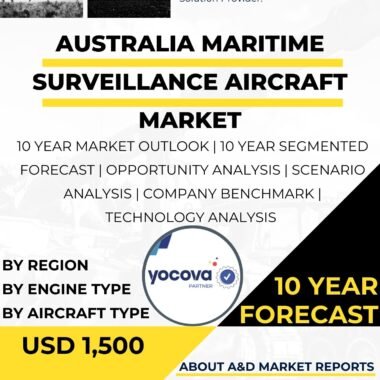Description
The Germany maritime surveillance aircraft market has emerged as a crucial segment within the country’s aerospace and defense industry. Maritime surveillance aircraft play a vital role in safeguarding a nation’s maritime borders, monitoring coastal regions, detecting and tracking maritime threats, conducting search and rescue operations, and supporting various maritime security and law enforcement missions. As one of the world’s leading economies and a prominent player in the global aerospace sector, Germany’s maritime surveillance aircraft market has witnessed steady growth and technological advancements in recent years.
The growing significance of maritime security and the protection of coastal waters have driven the demand for advanced maritime surveillance capabilities. With extensive coastlines and major maritime ports, Germany recognizes the importance of monitoring its maritime domain to combat maritime threats, such as piracy, smuggling, illegal fishing, and trafficking. Additionally, the protection of offshore assets, marine resources, and exclusive economic zones (EEZ) has become a national priority, further fueling the need for robust maritime surveillance aircraft.
The Germany maritime surveillance aircraft market has been influenced by the evolving maritime security landscape. As traditional naval threats have evolved, including asymmetric challenges from non-state actors and transnational criminal organizations, maritime surveillance aircraft have proven to be indispensable tools for gathering real-time intelligence and maintaining situational awareness over vast maritime areas.
Moreover, Germany’s strategic location within Europe and its role as an economic powerhouse necessitate effective maritime surveillance capabilities. As part of the European Union’s efforts to enhance maritime security and combat illegal activities in European waters, Germany has played a vital role in conducting joint maritime surveillance and patrolling missions. This has further emphasized the importance of advanced maritime surveillance aircraft in the country’s defense and security strategy.
Technological advancements have significantly impacted the Germany maritime surveillance aircraft market. Modern maritime surveillance aircraft are equipped with state-of-the-art sensors, radars, and advanced avionics systems, enabling them to detect and track surface vessels, submarines, and other maritime targets effectively. Additionally, the integration of intelligence, surveillance, and reconnaissance (ISR) systems with network-centric warfare concepts allows these aircraft to share real-time data with other assets, including naval vessels and coastal surveillance stations, enhancing overall maritime domain awareness.
The increasing use of unmanned aerial vehicles (UAVs) or drones in maritime surveillance is also influencing the market. Germany has shown a growing interest in employing UAVs for maritime reconnaissance, given their cost-effectiveness, extended endurance, and ability to operate in hazardous or remote maritime areas. Integrating UAVs into the maritime surveillance aircraft fleet can expand the country’s surveillance capabilities and support a wide range of missions.
Furthermore, the Germany maritime surveillance aircraft market is influenced by the country’s commitment to international cooperation and joint defense projects. Collaborations with other European nations in the development and acquisition of maritime surveillance aircraft and associated technologies facilitate resource sharing, interoperability, and the development of a cohesive maritime security framework in Europe.
The export potential of German maritime surveillance aircraft is also a significant aspect of the market. Germany’s reputation for producing high-quality and technologically advanced aerospace equipment makes it an attractive supplier for countries seeking to enhance their maritime surveillance capabilities. However, export decisions are subject to international regulations and geopolitical considerations, especially when it comes to sensitive defense technologies.
Challenges faced by the Germany maritime surveillance aircraft market include budget constraints and the need to balance investments in maritime surveillance capabilities with other defense priorities. As defense budgets are allocated to various sectors, including land, air, sea, and cyberspace domains, making informed decisions about resource allocation is crucial for maintaining a comprehensive and capable defense posture.
Additionally, the increasing complexity of maritime security challenges requires continuous technological advancements and the adaptation of maritime surveillance aircraft to new threats. Cybersecurity concerns, anti-access/area-denial (A2/AD) strategies, and the proliferation of advanced maritime technologies may influence the development and requirements of future maritime surveillance aircraft.
In conclusion, the Germany maritime surveillance aircraft market is a vital and evolving segment of the country’s aerospace and defense industry. The growing emphasis on maritime security, advancements in technology, and international cooperation have driven the demand for advanced maritime surveillance capabilities. Germany’s strategic location, maritime interests, and commitment to maintaining a modern and effective defense posture further underscore the importance of maritime surveillance aircraft. As the maritime security landscape evolves and technological advancements continue, the market is expected to play an essential role in safeguarding Germany’s maritime interests and contributing to international efforts in enhancing maritime security.




